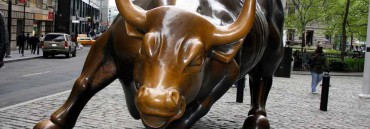DEFINITION of Bull
A bull is an investor who thinks the market, a specific security or industry is poised to rise.
WHAT IT IS IN ESSENCE
A bull has a positive outlook on an asset class or an entire market. In investing terminology, such trader stands the opposite of a bear.
They are investors who adopt a bull approach purchase securities under the assumption that they can sell them later at a higher price. Bulls are optimistic investors who are attempting to profit from the upward movement of stocks. They are speculators who believe that a market, assets, or sector is going on an upward course. This belief puts them at odds with bears, who take a pessimistic view on a market’s direction. When trading, they will tend to buy or go long on their market, in order to make a profit by selling when it becomes more worth in the future.
When a market is increasing in price, such traders are in power, they are taking control. This refers to as a bull market and it is the opposite of a bear market when the price is heading lower.
HOW TO USE
A bull market is when everything in the economy is great, people are finding jobs, GDP is growing, and stocks are rising.
Things are just plain rosy! Picking stocks during this market period is easier because everything is going up. But these markets cannot last forever though, and sometimes they can lead to dangerous situations if stocks become overvalued. If a person is optimistic, believing that stocks will go up, he or she is called a “bull” and said to have a “bullish outlook.”
Are you wondering what this animal is doing in the stock market? Of course, you do if you are new to the stock market.
Bullish is one of two types of trader or investors. Bullish traders are always in buy mode because they believe the stock or market price may rise. That’s why the bullish trader always tends to attack the market by buying stocks continuously.
The name ”bull trader” comes from animal characteristics. The bull uses horns to attack from down to the upward direction. And so in bullish trend stock price started to rise.
Of course, a bull, like bear tend, is determined by macro and a microeconomic factor. The one which affects the stock price to move up or down. Micro factors affect single stocks. So, it is important to keep an eye and ear open while trading in the stock market. Bullish investors see bearish market trends as an opportunity to buy strong stocks and adopt buy on dips strategy.
Whoever remains in the stock market for a longer period, becomes a millionaire and not a trader. Big bulls of the stock market like Warren Buffet.

